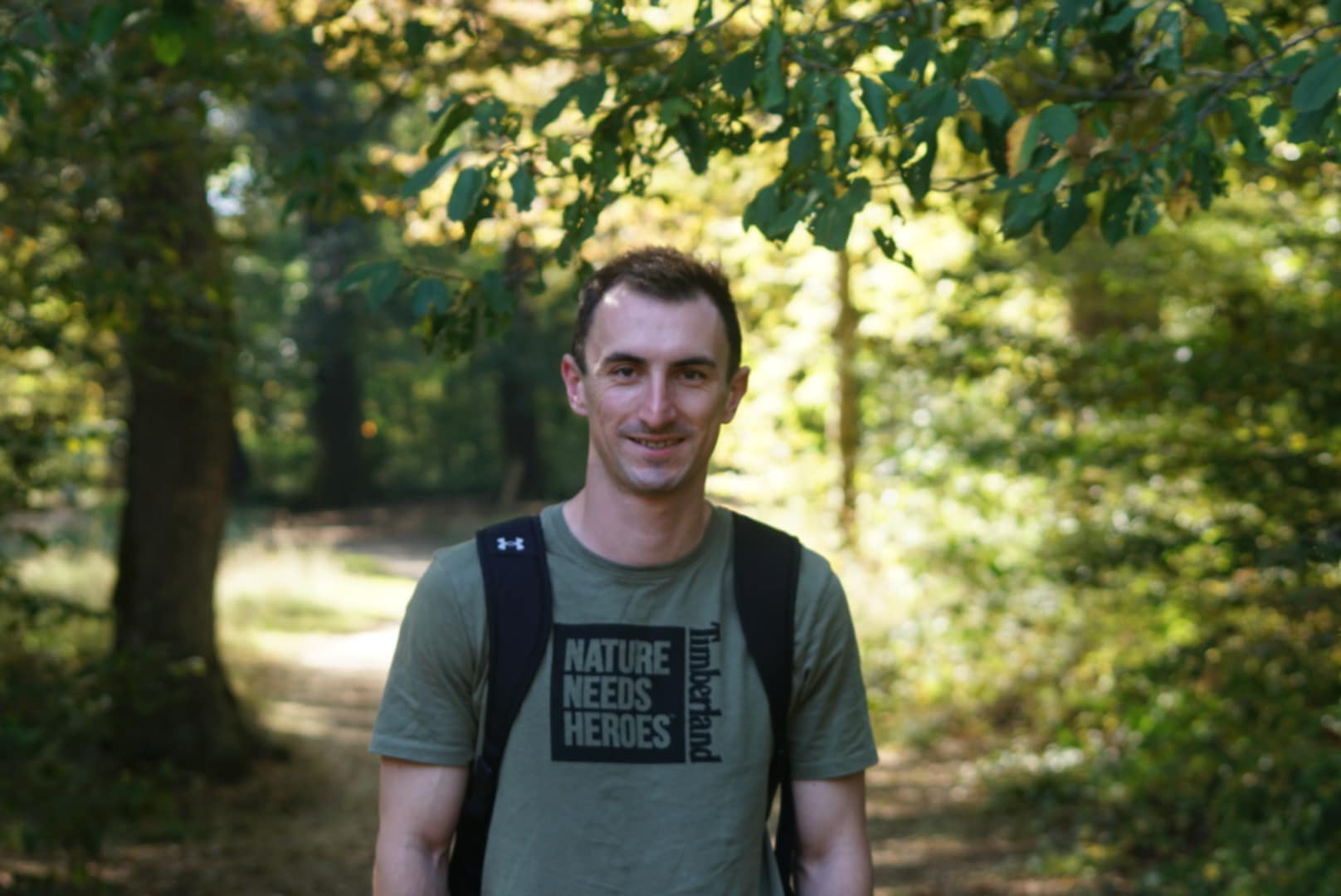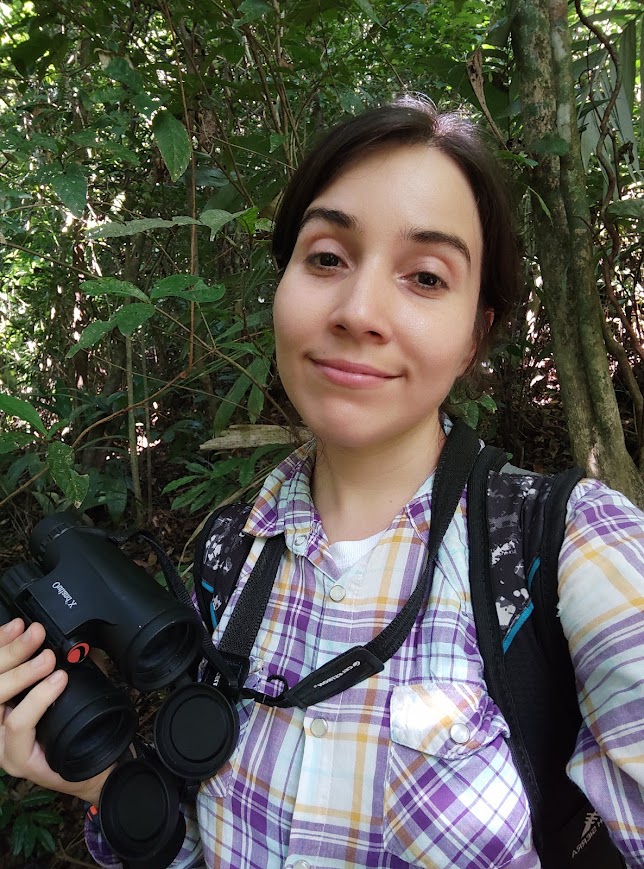Fahrig, L., C. Galán-Acedo, B.P.M. Edwards, A.K. Habrich, A.E. Martin, C.H. Albert, V. Arroyo-Rodríguez, A.D. Binley, J.R. Cole, J.K. Lockhart, S.E. Nielsen, F. Riva, M.P.R. Schmoeller, T. Tscharntke. Under review. The importance of matching scales in evaluating effects of fragmentation per se. Biological Conservation.
Beard, T., F. Riva, L. Fahrig, C. Galán-Acedo. Under review. Small patches have high conservation value for primates. Biological Conservation.
Galán-Acedo, C., A. Martin, F. Riva, L. Fahrig. Under review. Fragmentation per se decreases mean patch isolation. Landscape Ecology.
Martin, A., F. Riva, C. Galán-Acedo, L. Fahrig. Under review. Forest bird diversity increases with fragmentation per se in restored landscapes. Journal of Applied Ecology.
Arregoitia, L. V., J.C. Bicca Marques, A Chaudhary, R. Dobrovolski, P. Garber, C. Galán-Acedo, S. Gouveia, M. Friis Hansen, V. Nijman, S. Shanee, M. Svensson, F. Villalobos. Under review. Phylogenetic patterns in hunting and extinction risk in primates. Proceedings of the Royal Academy B..
PUBLISHED
31. Martin, A., C. Galán-Acedo, V. Arroyo-Rodríguez, L. Daly, S. English, A. Habrich, A. Hämäläinen, F. Riva, L. Fahrig. 2025. Complex measures of habitat fragmentation and edge can complicate biodiversity conservation. Conservation Letters.
30. Repullés. K., C. Galán-Acedo. 2025. Effects of habitat loss and fragmentation on Alouatta guariba patch occurrence in Brazil. Land, 14(3), 490.
29. Riva, F., C. Galán-Acedo, A. E., Martin, L. Fahrig. 2025. Why we should not assume that habitat fragmentation is generally bad for restoration. Restoration Ecology, e14385.
28. Martínez-Ruiz, M., V. Arroyo-Rodríguez, N. Arce-Peña, S. Cudney-Valenzuela, C. Galán-Acedo. 2025. Effect of forest loss and fragmentation per se on arboreal and ground mammals of the Lacandon rainforest, Mexico. Biodiversity and Conservation, 1-9.
27. Galán-Acedo, C., L. Fahrig. 2024. Stronger and more positive effects of fragmentation per se on patch occupancy in landscapes with higher matrix quality and lower matrix heterogeneity. Ecography, e07462.
26. Gordon, S., A. Duchesne, M. Dusevic, C. Galán-Acedo, L. Haddaway, S. Meister, A. Olive, M. Warren, J. Vincent, S. Cooke, J. Bennett. 2024. Assessing species at risk legislation across Canadian provinces and territories. FACETS, 9(1), 1-18.
25. Galán-Acedo, C., L. V. Arregoitia, R. Arasa-Gisbert, D. Auliz-Ortiz, L. L. Saldivar-Burrola, S. Gouveia, I. Correia, F. A. Rosete-Vergés, R. Dinnage, F. Villalobos. 2024. Global primary predictors of extinction risk in primates. Proceedings of the Royal Academy B., 291(2032), 20241905.
24. Riva, F., C. Martin, C. Galán-Acedo, E. Bellon, P. Keil, A. Morán-Ordóñez, L. Fahrig, A. Guisan. 2024. Incorporating the effects of habitat patches in species distribution models. Journal of Ecology, 112(10), 2162-2182.
23. Galán-Acedo, C., L. Fahrig, F. Riva, T. Schulz. 2024. Positive effects of fragmentation per se on the most iconic metapopulation. Conservation Letters. e13017.
22. Galán-Acedo C., G. Pacheco-Hass, V. Klain, P. B. E. da Silva, J. C. Bicca-Marques. 2024. Urban matrices threaten patch occurrence of howler monkeys in anthropogenic landscapes. Land. 13(4), 514.
21. Galán-Acedo, C., R. Arasa-Gisbert, V. Arroyo-Rodríguez, M. Martínez-Ruiz, F.Villalobos, F. Rosete-Vergés. 2023. Linear vs non-linear effects of forest loss on Brazilian primates: an assessment of extinction thresholds. Perspectives in Ecology and Conservation
20. Arroyo-Rodríguez, V., Martínez-Ruiz, M., Bezerra, J. S., Galán-Acedo, C., San-José, M., & Fahrig, L. 2023. Does a Species’ Mobility Determine the Scale at Which It Is Influenced by the Surrounding Landscape Pattern? Current Landscape Ecology Reports, 1-11.
19. Ramos Luna, J., C. Twining-Ward, J. Paula Back, J. Barakagwira, J. César Bicca-Marques, M. Chanvin, N. Diko, J. Duboscq, P. Fan, C. Galán-Acedo, J.F. Gogarten, S. Guo, D. Guzman-Caro, R. Hou, U. Kalbitzer, B. Kaplin, S. Lee, A. Mekonnen, P. Mungongo, H. Nautiyal, P. Omeja, V. Ramananjato, N. Raoelinjanakolona, O. Razafindratsima, C. Sarabian, D. Sarkar, J.C. Serio-Silva, R. Yanti, C.A. Chapman. 2022. Social media’s potential to promote conservation at the local level: A global tropical assessment with primates. Folia primatologica.
18. Chapman, C., C. Galán-Acedo, J.F. Gogarten, R. Hou, M.J. Lawes, P.A. Omeja, D. Sarkar, A. Sugiyama, U. Kalbitzer. 2021. A 40-year evaluation of drivers of Africanrainforest change. Forest Ecosystems. DOI: 10.21203/rs.3.rs-414446/v1
17. Galán-Acedo, C., D. Spaan, J.C. Bicca-Marques, F. Villalobos, F. Rosete-Verges. 2021. Regional deforestation drives the impact of forest cover and matrix quality on primate richness. Biological Conservation, 263, 109338.
16. Arasa-Gisbert, R., V. Arroyo-Rodríguez, C. Galán-Acedo, J. Meave, M. Martínez-Ramos. 2021. Tree recruitment failure in old‐growth forest patches across human‐modified rainforests. Journal of Ecology, 109(6), 2354-2366.
15. Galán-Acedo, C., V. Arroyo-Rodríguez & C. Chapman. 2021. Beyond patch size: The impact of regional context and habitat quality on three endangered primates. Perspectives in Ecology and Conservation, 19(2), 207-2015.
14. Galán-Acedo, C. , V. Arroyo-Rodríguez, E. Andresen & P.A. Días. 2021. Regional context mediates the response of Mexican primates to landscape structure in fragmented rainforests. Biological conservation, 255, 109006.
13. Alcocer-Rodríguez, M., V. Arroyo-Rodríguez, C. Galán-Acedo, J. Cristóbal-Azkarate, N. Asensio, K. F. Rito, J. E. Hawes, J. J. Veá & J. C. Dunn. 2021. Evaluating extinction debt in fragmented forests: the rapid recovery of a critically endangered primate. Animal conservation, 24(3), 432-444.
12. Arroyo-Rodríguez, V., L. Fahrig, M. Tabarelli, J. I. Watling, L. Tischendrorf, M. Benchimol, E. Cazetta, D. Faria, I. R. Leal, F. P. L. Melo, J. C. Morante-Filho, B. Santos, R. Arasa-Gisbert, N. Arce-Peña, M. J. Cervantes-López, S. Cudney-Valenzuela, C. Galán-Acedo, M. San-José, I. C. G. Vieira, F. Slik, J. Nowakowski, B. T. Phallan & T. Tscharntkle. 2020. Designing optimal human-modified landscapes for forest biodiversity conservation. Ecology letters, 23(9), 1404-1420.
11. Galán-Acedo, C., V. Arroyo-Rodríguez, S. Cudney-Valenzuela & L. Fahrig. 2019. A global assessment of primate responses to landscape structure. Biological Reviews, 94(5), 1605-1618.
10. Galán-Acedo, C., V. Arroyo-Rodríguez, A. Estrada & G. Ramos-Fernández. 2019. Forest cover and matrix functionality drive the abundance and reproductive success of an endangered primate in two fragmented rainforests. Landscape Ecology, 34, 147-158.
9. Galán-Acedo, C., V. Arroyo-Rodríguez, R. Arasa-Gisbert & E. Andresen. 2019. Ecological traits of the world’s primates. Scientific Data, 6, 1-5.
8. Galán-Acedo, C., V. Arroyo-Rodríguez, E. Andresen, L. V. Arregoitia, E. Vega, C. A. Peres & R. M. Ewers. 2019. The conservation value of human-modified landscapes for the world’s primates. Nature Communications, 10, 152.
7. Galán-Acedo, C., V. Arroyo-Rodríguez, A. Estrada & G. Ramos-Fernández. 2018. Drivers of the spatial scale that best predict primate responses to landscape structure. Ecography, 41(12), 2027-2037.
6. Arroyo-Rodríguez, V., C.E. Moreno & C. Galán-Acedo. 2017. La ecología del paisaje en México: logros, desafíos y oportunidades en las ciencias biológicas. Revista Mexicana de Biodiversidad, 88, 42-51.
BOOK CHAPTERS
5. Hutschenreiter, A., D. Spaan, C. Galán-Acedo, F. Aureli. In press. Survey methods for Mexican primates and their elegibility for hierarchical modeling. Neotropical Mammals: Hierarchical Analysis of Occupancy and Abundance. Springer.
4. Arroyo-Rodríguez, V., R. Arasa-Gisbert, N.P. Arce-Peña, M.J. Cervantes-López, S.J. Cudney-Valenzuela, C. Galán-Acedo, M.A. Hernández-Ruedas, M. San-José & L. Fahrig. 2022. The importance of small rainforest patches for biodiversity conservation: a multi-taxonomic assessment. Biodiversity Islands: Pockets of Protected Land in Human Dominated Environments, Springer.
3. Arroyo-Rodríguez, V. & C. Galán-Acedo. 2019. Importancia de la estructura del paisaje para la conservación de primates. Primatología, diversidad biocultural y desarrollo sotenible en los bosques tropicales: una perspectiva global. UNESCO.
2. Arroyo-Rodríguez, V., R. Arasa-Gisbert, N. Arce-Peña, M.J. Cervantes-López, S.J. Cudney, C. Galán-Acedo, M.A. Hernández-Ruedas, K.F. Rito & M. San-José. 2019. Determinantes de la biodiversidad en paisajes antrópicos: una revisión teórica. Moreno C.E. (ed.) Evaluación de la biodiversidad. SEP-CONACYT.
1. Arroyo-Rodríguez, V., C. Galán-Acedo & L. Fahrig. 2017. Habitat fragmentation. In: Fuentes, A. (ed.) The International Encyclopedia of Primatology. Wiley-Blackwell publisher, New York. Pp. 1-10.
PUBLIC DATA BASES
Galán-Acedo, C., V. Arroyo-Rodríguez, E. Andresen, R. Arasa-Gisbert. 2018. Ecological traits of the world’s primates database. Zenodo. Doi: 10.5281/zenodo.3368372
SCIENTIFIC DISSEMINATION
Saldívar-Burrola, L.S., C. Galán-Acedo, F. Villalobos. 2021. Umbrales de extinción en bosques tropicales. Revista electrónica del Instituto de Ecología, A.C. (INECOL).
Galán-Acedo, C., F. Villalobos. 2021. Primates en paisajes antropizados. Revista electrónica del Instituto de Ecología, A.C. (INECOL).
Arregoitia, L. V., C. Galán-Acedo. 2019. Surviving the Anthropocene: Primates in human-modified landscapes. Edge of existence (https://www.edgeofexistence.org/).
CV

See my CV here.
Research (under construction)
Habitat Loss & Fragmentation
Forest Restoration Ecology
Nature-Based Climate Solutions
Habitat Loss & Fragmentation
Restoration Ecology
Nature-Based Climate Solutions
Students
MSc students

Zilva van Rossum (Visiting student, 2024).
Project: ‘Assessing the effect of landscape quality and heterogeneity on the Glanville fritillary butterfly genetics’.
Zilva was a visiting master’s student from the University of Amsterdam in The Netherlands. In her project, she studied dispersal adaptations in the Glanville fritillary butterfly in response to fragmentation per se, matrix quality, and heterogeneity. Zilva successfully defended her thesis in March 2025 and she is currently working on her manuscript.

Tom Beard (Visiting student, 2024).
Project: ‘Assessing the conservation value of small patches for primates’.
Tom was a visiting master’s student from the Université de Franche-Comté in France. In his project, he used extensive data and a SLOSS (Single Large vs. Several Small) approach to assess the value of small forest patches for primate conservation. He successfully defended his thesis in October 2024, and he is currently working on his manuscript.

Katia Repullés (2023–2024).
Project: ‘Effects of habitat loss and fragmentation on Alouatta guariba’.
Katia was an MSc student at Universitat de Girona (Spain) who conducted her thesis under my supervision. In her thesis, she analyzed approximately 1,000 landscapes in Brazil to assess the effects of habitat amount and fragmentation on the occurrence of the Brown howler monkey (Alouatta guariba). She successfully defended her thesis in October 2024, and her research was published as a scientific paper in Land.
- Repullés, K., Galán-Acedo, C. (2025). Effects of Habitat Loss and Fragmentation on the Occurrence of Alouatta guariba in Brazil, Land, 14(3), 490. here is the paper

Paulina Aguirre Garcia (2022-2024).
Project: ‘ Assessment of behavior, roadkill probability, and road use by primates’.
Paulina was an MSc student at Universidad Veracruzana (Mexico) who conducted her thesis under my supervision and was co-supervised by Dr. Denise Spaan. In her thesis, she used citizen science to assess how species traits affect road use and roadkill probability worldwide. She also examined primate behavior on roads. She successfully defended her thesis in October 2024, and she is currently working on two manuscripts.
News
2025
June
- I am attending the 61ˢᵗ Annual Meeting of the Association for Tropical Biology and Conservation in Oaxaca, Mexico
- I joined the new Master’s program in Primatology at the University of Barcelona, Spain, where I will teach Fundamentals of Landscape Ecology. Check it out here.
- Rong Fan, a PhD student from Beijing Forestry University, will apply for a China Scholarship Council grant to conduct a two-year research stay with me and Dr. Lenore Fahrig at Carleton University.
- I found out that my research has been cited in 11 international policy documents. Check it out or check your own research here.
May
- Krystal Ludgate started her directed summer studies with me.
March
- Zilva van Rossum successfully defended her thesis at University of Amsterdam! Huge congratulations :)
- Our article Complex measures of habitat fragmentation and edge can complicate biodiversity conservation is accepted and published in Conservation Letters. here is the paper
February
- I am looking for a PhD student and/or an MSc student to conduct projects on resilient landscapes. Applications are due by March 31.
- Katia's thesis article is accepted and published in the journal Land.
- Repullés, K., Galán-Acedo, C. (2025). Effects of Habitat Loss and Fragmentation on the Occurrence of Alouatta guariba in Brazil, Land, 14(3), 490. here is the paper
January
- Our symposium "Understanding the Main Predictors of Biodiversity Loss in Human-Modified Tropical Landscapes" is accepted for the 61st Annual Meeting of the Association for Tropical Biology and Conservation (ATBC) and will be presented in June in Oaxaca, Mexico.
- Two of our articles on fragmentation are published! Collaborations with amazing researchers :)
- Martínez-Ruiz, M., Arroyo-Rodríguez, V., San-José, M., Arce-Peña, N., Cudney-Valenzuela, S., & Galán-Acedo, C. (2025). Effect of forest loss and fragmentation per se on arboreal and ground mammals of the Lacandon rainforest, Mexico. Biodiversity and Conservation, 1-19. here is the paper
- Riva, F., Galán-Acedo, C., Martin, A.E., Fahrig, L. (2025). Why we should not assume that habitat fragmentation is generally bad for restoration: a reply to Watts and Hughes (2024). Restoration Ecology. here is the paper
2024
October
- Zilva van Rossum, a master's student from the University of Amsterdam, starts her internship with me and Dr. Lenore Fahrig.
- Paulina Aguirre Garcia, supervised by me and co-supervised by Dr. Denise Spaan, graduates with honors from Universidad Veracruzana! Congratulations :) here is her thesis.
- Tom Beard completes his master's degree at the Université de Franche-Comté with a thesis supervised by me and co-supervised by Dr. Lenore Fahrig. Congratulations, Tom!
- Katia Repullés graduates from Universitat de Girona with a thesis supervised by me. Congratulations!!
August
- I attend the Butterfly Modeling and Conservation Workshop at the Montréal Insectarium, organized by Dr. Federico Riva and Dr. Maxime Larrivée.
June
- I assist to the 7th European Congress of Conservation Biology (ECCB) held in Bologna, Italy
February
- Tom Beard, from the Université de Franche-Comté, joins the lab for an internship and to conduct his master's thesis research with me and Dr. Lenore Fahrig.
Opportunities
Ask about new opportunities at cgalanac@gmail.com or CarmenGalanAcedo@cunet.carleton.ca
Elements
Text
This is bold and this is strong. This is italic and this is emphasized.
This is superscript text and this is subscript text.
This is underlined and this is code: for (;;) { ... }. Finally, this is a link.
Heading Level 2
Heading Level 3
Heading Level 4
Heading Level 5
Heading Level 6
Blockquote
Fringilla nisl. Donec accumsan interdum nisi, quis tincidunt felis sagittis eget tempus euismod. Vestibulum ante ipsum primis in faucibus vestibulum. Blandit adipiscing eu felis iaculis volutpat ac adipiscing accumsan faucibus. Vestibulum ante ipsum primis in faucibus lorem ipsum dolor sit amet nullam adipiscing eu felis.
Preformatted
i = 0;
while (!deck.isInOrder()) {
print 'Iteration ' + i;
deck.shuffle();
i++;
}
print 'It took ' + i + ' iterations to sort the deck.';
Lists
Unordered
- Dolor pulvinar etiam.
- Sagittis adipiscing.
- Felis enim feugiat.
Alternate
- Dolor pulvinar etiam.
- Sagittis adipiscing.
- Felis enim feugiat.
Ordered
- Dolor pulvinar etiam.
- Etiam vel felis viverra.
- Felis enim feugiat.
- Dolor pulvinar etiam.
- Etiam vel felis lorem.
- Felis enim et feugiat.
Icons
Actions
Table
Default
| Name |
Description |
Price |
| Item One |
Ante turpis integer aliquet porttitor. |
29.99 |
| Item Two |
Vis ac commodo adipiscing arcu aliquet. |
19.99 |
| Item Three |
Morbi faucibus arcu accumsan lorem. |
29.99 |
| Item Four |
Vitae integer tempus condimentum. |
19.99 |
| Item Five |
Ante turpis integer aliquet porttitor. |
29.99 |
|
100.00 |
Alternate
| Name |
Description |
Price |
| Item One |
Ante turpis integer aliquet porttitor. |
29.99 |
| Item Two |
Vis ac commodo adipiscing arcu aliquet. |
19.99 |
| Item Three |
Morbi faucibus arcu accumsan lorem. |
29.99 |
| Item Four |
Vitae integer tempus condimentum. |
19.99 |
| Item Five |
Ante turpis integer aliquet porttitor. |
29.99 |
|
100.00 |





